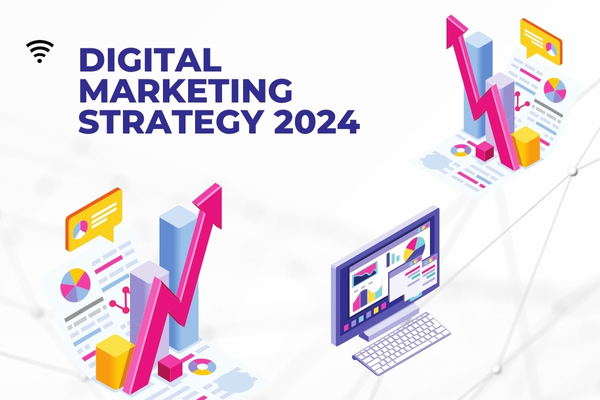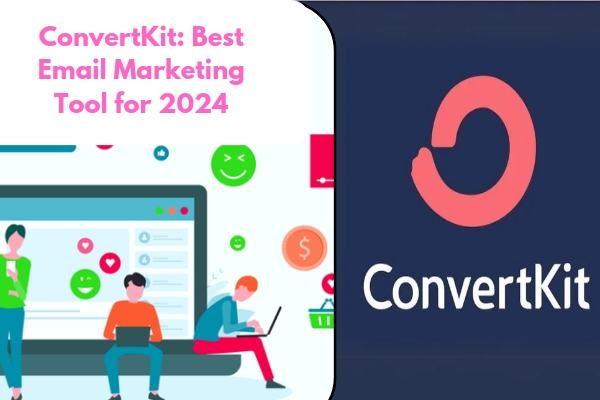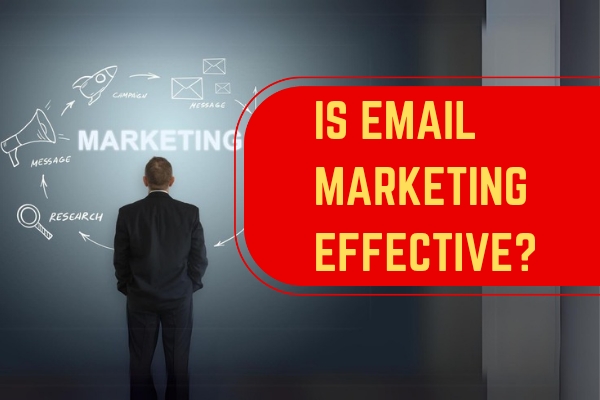In the ever-evolving world of digital marketing, staying ahead of the curve in digital marketing is paramount. The year 2024 promises to bring a wave of transformative trends in digital marketing, challenging marketers to adapt and innovate. This comprehensive article explores the 20 most influential digital marketing trends that are set to reshape the digital marketing industry in 2024.
Artificial Intelligence (AI) and Machine Learning

AI-Driven Personalization
Artificial intelligence continues to revolutionize digital marketing with hyper-personalization. AI algorithms analyze vast datasets to craft tailored experiences for users in the field of digital marketing. From personalized product recommendations to content customization, AI is the driving force behind delivering content that resonates with individual preferences in digital marketing.
Predictive Analytics for Campaign Optimization
Predictive analytics powered by AI enables marketers in digital marketing to forecast future trends and consumer behaviors. By leveraging historical data, AI can predict campaign performance and optimize strategies in real-time, ensuring digital marketing efforts yield maximum impact.
Chatbots and Conversational Marketing
Chatbots have evolved into sophisticated conversational agents in the realm of digital marketing. They engage with customers in real-time, answering queries, providing assistance, and guiding purchasing decisions. Conversational marketing harnesses AI-driven chatbots to facilitate meaningful interactions, enhancing customer experiences in digital marketing.
AI-Generated Content
AI-generated content is gaining traction in digital marketing. Natural language processing (NLP) algorithms can create articles, reports, and product descriptions. While AI-generated content streamlines content production, it also raises questions about authenticity and the human touch in digital marketing.
Video Marketing Advancements In Digital Marketing
Shoppable Videos and Direct Purchases
Shoppable videos have become a game-changer in e-commerce within digital marketing. Viewers can click on products within videos and make purchases without leaving the video player. This seamless shopping experience blurs the lines between entertainment and commerce in digital marketing.
Interactive Video Content
Interactive videos invite viewers to actively engage with content in digital marketing. Whether it’s choosing different story paths or participating in quizzes, interactive videos captivate audiences and keep them engaged. This trend transforms passive viewers into active participants.
Live Streaming and Real-time Engagement
Live streaming has emerged as a powerful tool for brands to connect with their audience in real-time within digital marketing. Whether it’s product launches, behind-the-scenes glimpses, or live Q&A sessions, brands can foster a sense of immediacy and authenticity, driving engagement and building trust in digital marketing.
Video SEO and Optimization
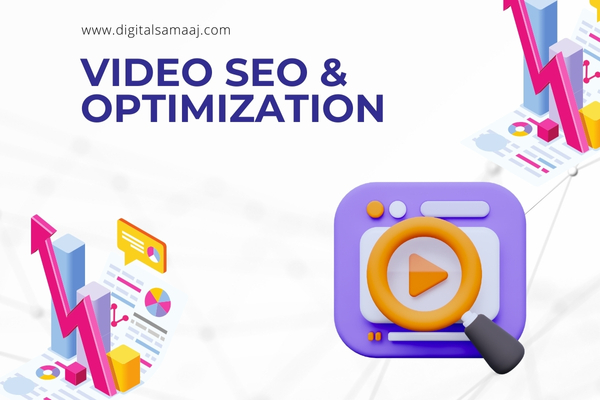
Optimizing video content for search engines is a vital aspect of video marketing in digital marketing. Marketers need to focus on video SEO techniques, including keyword optimization, metadata, and video schema markup. As video consumption continues to rise, ranking well in video search results becomes increasingly valuable in digital marketing.
The Growing Impact of Voice Assistants
Voice-activated digital assistants like Siri, Alexa, and Google Assistant are becoming ubiquitous within digital marketing. Optimizing content for voice search is no longer an option—it’s a necessity in digital marketing. Users rely on voice assistants for quick answers and information, and marketers must ensure their content is voice-search-friendly.
Crafting Content for Voice Search Queries
Voice search queries differ from typed searches in digital marketing. They tend to be longer and more conversational. Understanding user intent behind voice queries and tailoring content to provide concise, relevant answers is crucial to maintain visibility in voice search results in digital marketing.
Voice SEO Strategies and Implementation
Voice SEO involves optimizing content for voice search queries in digital marketing. This includes using natural language, answering common questions directly, and providing local information. Optimizing structured data and schema markup also play a pivotal role in improving voice search visibility in digital marketing.
Blockchain in Digital Advertising
Enhancing Transparency and Trust
Blockchain technology is disrupting the digital advertising landscape by providing a transparent and tamper-proof ledger for tracking ad transactions in digital marketing. It eliminates intermediaries and offers advertisers and consumers greater confidence in the authenticity of ad impressions and clicks, fostering trust.
Combatting Ad Fraud with Blockchain
Ad fraud remains a significant challenge in digital advertising in digital marketing. Blockchain’s decentralized nature can prevent fraudulent activities by validating ad impressions and verifying the legitimacy of traffic sources. This trend encourages advertisers to allocate resources toward more secure and accountable platforms in digital marketing.
Decentralized Data Management
Blockchain allows users to have greater control over their data in digital marketing. Users can grant access to their data on their terms, enhancing privacy and security. In an era where data privacy is paramount, blockchain’s decentralized data management practices will reshape ethical data handling in digital marketing.
Sustainability-Driven Marketing
Consumer Demand for Eco-Friendly Brands
Consumers increasingly seek eco-friendly and socially responsible brands in digital marketing. Sustainability-driven marketing involves showcasing green practices, such as reducing carbon footprints, ethical sourcing, and eco-packaging. Brands aligning with sustainability trends resonate with conscientious consumers in digital marketing.
Sustainable Advertising Practices
Sustainability extends to the advertising practices themselves in digital marketing. Minimizing paper waste, reducing energy consumption in ad delivery, and using sustainable materials in marketing materials are part of sustainable advertising. These practices not only benefit the environment but also enhance a brand’s reputation in digital marketing.
Augmented and Virtual Reality (AR/VR) Integration
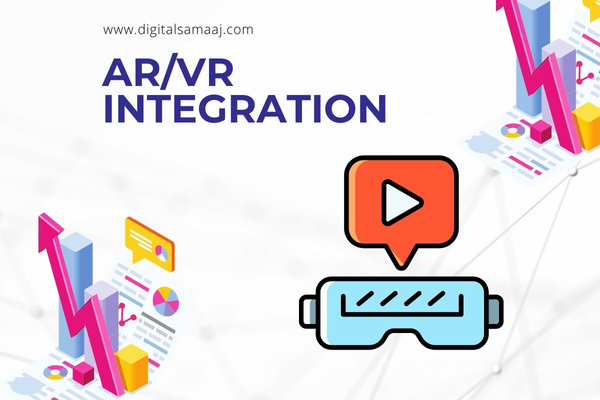
Immersive Brand Experiences
AR and VR technologies enable brands to create immersive experiences in digital marketing. Virtual showrooms, augmented product try-ons, and interactive brand storytelling captivate audiences and provide unique engagement opportunities. These experiences leave lasting impressions on consumers in digital marketing.
AR/VR Applications in E-commerce and Retail
In e-commerce and retail, AR and VR are revolutionizing shopping experiences. Virtual try-on features, 3D product views, and AR navigation in physical stores enhance the shopping journey. Brands that embrace AR/VR gain a competitive edge by offering interactive and informative experiences in digital marketing.
Overcoming Challenges in AR/VR Content Creation
Creating high-quality AR/VR content poses challenges. Content creators must master 3D modeling, augmented reality programming, and virtual world design. Overcoming these technical challenges is essential to fully harness the potential of AR and VR in marketing in digital marketing.
Inclusivity and Accessibility
Embracing Diversity in Marketing
Inclusive marketing celebrates diversity in advertising campaigns, representing various cultures, backgrounds, and lifestyles in digital marketing. Brands that authentically embrace diversity resonate with a broader audience and build trust among consumers who appreciate authentic representations.
Prioritizing Website Accessibility
Digital marketers must prioritize website accessibility in digital marketing. This includes providing alt text for images, ensuring keyboard navigation, and using semantic HTML. Accessible content ensures that everyone, including individuals with disabilities, can engage with digital marketing materials.
Promoting Inclusivity in Advertising Campaigns
Inclusivity goes beyond token gestures in digital marketing. It involves actively promoting inclusivity in advertising content and campaigns. Brands should challenge stereotypes and showcase a diverse range of voices and experiences, fostering goodwill and connections with consumers.
Data Privacy and Compliance
Stricter Data Privacy Regulations
Data privacy regulations like GDPR and CCPA are becoming more stringent in digital marketing. Marketers must adhere to these regulations, ensuring the security and privacy of customer data. Non-compliance can result in hefty fines and damage to a brand’s reputation in digital marketing.
Consent Management Platforms (CMPs)
Consent Management Platforms are essential tools for managing user data permissions in digital marketing. CMPs enable brands to obtain clear and informed consent from users for data collection and processing. Effective use of CMPs ensures compliance with data privacy regulations in digital marketing.
Navigating the Privacy-First Era
The shift towards a privacy-first era requires digital marketers to adapt their strategies in digital marketing. This includes minimizing data collection, implementing encryption measures, and respecting user preferences regarding data sharing. Embracing this shift ensures that brands remain trustworthy and data-conscious in the eyes of consumers in digital marketing.
Emerging Social Media Platforms and Trends
New Platforms Gaining Traction
The social media landscape continues to evolve with new platforms gaining popularity in digital marketing. Marketers need to stay vigilant and adapt their strategies to emerging platforms that resonate with their target audiences in digital marketing.
The Rise of Short-Form Video Content
Short-form video content, such as TikTok and Instagram Reels, is taking center stage in digital marketing. Brands must embrace this trend by creating engaging short videos that capture users’ attention in seconds in digital marketing.
Content Marketing Evolution
Long-Form Content’s Resurgence
Long-form content is making a comeback in digital marketing. In-depth articles, comprehensive guides, and whitepapers provide valuable information to readers and can improve search engine rankings in digital marketing.
User-Generated Content Strategies
User-generated content is a powerful marketing tool in digital marketing. Encouraging customers to create content related to your brand fosters trust and authenticity. Leveraging user-generated content in campaigns can build a loyal community in digital marketing.
Content Repurposing and Sustainability
Content repurposing involves recycling existing content into different formats. For example, a blog post can become a podcast or a video. This strategy saves time and ensures content reaches a broader audience in digital marketing.
Email Marketing Innovations
Hyper-Personalization and Segmentation
Email marketing is evolving with hyper-personalization in digital marketing. AI-driven segmentation and targeted email campaigns ensure that messages are tailored to individual preferences, boosting open and conversion rates in digital marketing.
Interactive Email Campaigns
Interactive emails engage subscribers in digital marketing. Features like surveys, polls, and interactive product showcases make emails more captivating and encourage user interaction in digital marketing.
AI-Enhanced Email Analytics
AI is enhancing email analytics by providing deeper insights into subscriber behavior in digital marketing. Marketers can gain a better understanding of what resonates with their audience and refine their strategies accordingly in digital marketing.
Search Engine Optimization (SEO) in 2023
Core Web Vitals and User Experience
Google’s Core Web Vitals focus on user experience in digital marketing. SEO strategies need to prioritize factors like page loading speed, mobile responsiveness, and visual stability to meet these criteria in digital marketing.
Mobile-First Indexing and Optimization
Mobile-first indexing means Google primarily uses the mobile version of a site for ranking and indexing in digital marketing. Optimizing websites for mobile devices is crucial for SEO success in digital marketing.
Voice Search and Local SEO Strategies
With the rise of voice search, optimizing for local SEO becomes vital in digital marketing. Local businesses should ensure their online presence is optimized for voice search queries in digital marketing.
Data-Driven Decision-Making
The Role of Big Data in Marketing
Big data analytics empower marketers with valuable insights in digital marketing. Leveraging big data allows for more informed decision-making and better understanding of customer behavior in digital marketing.
Marketing Automation and Data Integration
Marketing automation tools are becoming essential for managing data and campaigns in digital marketing. Integrating data across platforms ensures a unified view of the customer journey in digital marketing.
Real-time Analytics for Rapid Adaptation
Real-time analytics enable marketers to make rapid adjustments to campaigns based on live data in digital marketing. This agility is invaluable in responding to changing market conditions in digital marketing.
Globalization and Localization
Expanding Reach in Global Markets
Globalization allows brands to expand their reach to international markets in digital marketing. However, it requires careful cultural sensitivity and adaptation of marketing strategies to resonate with diverse audiences in digital marketing.
Cultural Sensitivity in International Marketing
Marketing campaigns must consider cultural nuances to avoid misinterpretation or offense in international markets in digital marketing. Understanding local customs and beliefs is critical in digital marketing.
Localization of Content and Campaigns
Localization involves translating and adapting content to suit regional preferences and language in digital marketing. It ensures that marketing materials resonate with local audiences in digital marketing.
Ephemeral Content and FOMO Marketing
The Popularity of Ephemeral Content
Ephemeral content, such as Stories on platforms like Instagram and Snapchat, has become immensely popular in digital marketing. It offers a sense of urgency and exclusivity, driving user engagement in digital marketing.
Harnessing FOMO (Fear of Missing Out) in Campaigns
FOMO marketing leverages the fear of missing out to drive action in digital marketing. Limited-time offers, flash sales, and exclusive access can create a sense of urgency and boost conversion rates in digital marketing.
Ephemeral Content Analytics
Analyzing the performance of ephemeral content is essential in digital marketing. Marketers should track metrics like views, engagement, and click-through rates to gauge the effectiveness of their Stories in real-time. This data provides valuable insights into how well the content resonates with the audience and whether it’s driving the desired actions. By closely monitoring these metrics, digital marketers can make informed decisions, adjust their content strategy, and optimize their ephemeral content to better connect with their target audience.
The Role of Micro-Moments in Marketing
Understanding Micro-Moments
Micro-moments are instances when users turn to their devices for quick answers, information, or inspiration. Recognizing and catering to these moments is crucial for brands in digital marketing.
Crafting Micro-Moment Content
Creating content that addresses micro-moments requires brevity and relevance in digital marketing. Marketers should provide concise, valuable information that satisfies users’ immediate needs in digital marketing.
Micro-Moments in the Customer Journey
Micro-moments aren’t isolated; they play a role throughout the customer journey in digital marketing. Understanding how these moments influence awareness, consideration, and decision-making is key to effective marketing in digital marketing.
Social Commerce and Direct Shopping
Social Media as Sales Channels
Social commerce is on the rise, turning social media platforms into direct sales channels in digital marketing. Brands can showcase products, engage with customers, and facilitate purchases without users leaving their preferred social networks in digital marketing.
Integration of Shopping Features
Social media platforms are integrating shopping features seamlessly in digital marketing. From product tags to in-app checkout options, users can now shop directly through social media posts and stories in digital marketing.
Conversion Rate Optimization in Social Commerce
Optimizing conversion rates in social commerce involves crafting compelling product descriptions, providing seamless checkout experiences, and leveraging user-generated content for social proof in digital marketing.
Agile Marketing Strategies
The Agile Approach to Marketing
Agile marketing is a methodology that prioritizes flexibility and responsiveness in digital marketing. Marketers adapt quickly to changing circumstances, leveraging data and feedback to refine strategies in digital marketing.
Implementing Agile Methodologies
Implementing agile marketing involves cross-functional teams, iterative planning, and regular retrospectives to assess and improve campaigns continuously in digital marketing.
Benefits of Agile Marketing in a Dynamic Landscape
Agile marketing is well-suited for the fast-paced digital marketing landscape. It enables marketers to pivot swiftly, capitalize on opportunities, and stay ahead of evolving trends in digital marketing.
Conclusion
In conclusion, 2024 promises to be a year of unprecedented change and innovation in the field of digital marketing. These 20 trends, ranging from AI-driven personalization to agile marketing strategies, will shape the marketing landscape for the foreseeable future. Staying informed, adaptable, and responsive to these trends will be crucial for marketers aiming to succeed in this dynamic and competitive arena. As technology advances and consumer preferences evolve, digital marketers must embrace these trends to connect with their audience effectively and achieve their goals in the ever-evolving digital realm. Keep a close eye on these trends, and remember that the key to successful digital marketing is staying ahead of the curve and being ready to adapt to the ever-changing landscape.
Read More: Home

